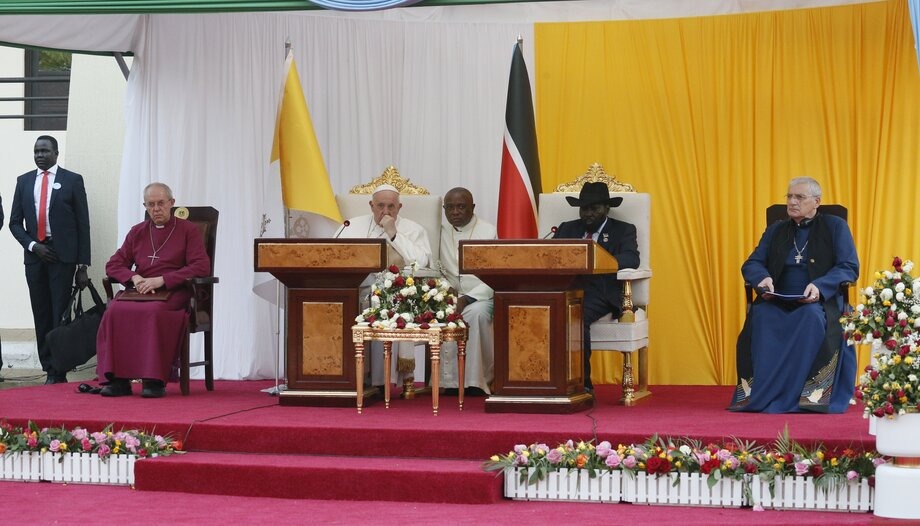 The Catholic Church in Congo and South Sudan
The Catholic Church in Congo and South Sudan A song of hope in South Sudan
A song of hope in South Sudan Africa prepares to receive the Pope
Africa prepares to receive the PopePope Francis landed in South Sudan on February 3, a land to which he arrived "as a pilgrim of reconciliation, with the dream of accompanying them on their journey of peace". During his meeting with the country's authorities and the diplomatic corps, he emphasized precisely this characteristic: "it is the hour of peace".
Francis considered this visit as an itinerary that starts "precisely from the search for the sources of our coexistence. Because this land, which abounds with many goods in the subsoil, but, above all, in the hearts and minds of its inhabitants, today needs to quench its thirst again in fresh and vital springs".
The Holy Father referred to the authorities as those sources that the inhabitants need. Therefore, "future generations will honor or erase the memory of your names on the basis of what you do now, because, just as the river leaves the springs to begin its course, so too the course of history will leave behind the enemies of peace and will give renown to those who worked for peace."
The Pope called for an end to the violence in Sudan, saying: "Enough of bloodshed, enough of conflict, enough of aggression and mutual accusations about who is guilty, enough of leaving the people thirsty of peace. Enough of destruction, it is time for construction. We must leave behind the time of war and bring about a time of peace".
He later added that ending violence implies commitment "in favor of a transformation that is urgent and necessary. The peace and reconciliation process requires a new impetus".
Meeting with bishops, priests and consecrated persons
During his meeting with the bishops, priests and consecrated persons, the Pope wanted to focus on the evangelizing work of all these people, launching a question: "How to exercise the ministry in this land, along the banks of a river bathed by so much innocent blood, while the faces of the people entrusted to us are furrowed with tears of pain?" The answer to the question is sought by the Pope in Moses, in his docility and in his intercession.
Francis pointed out that Moses approached God with awe and humility, "he allowed himself to be attracted and guided by God". Therein lies the example, so "let us trust in his Word before using our words, let us meekly welcome his initiative before focusing on our personal and ecclesial projects; for primacy is not ours, primacy is of God". Being docile, continues the Holy Father, "makes us live the ministry in a renewed way."
Regarding intercession, Francis said that "the specialty of pastors must be to walk in the midst: in the midst of sufferings, in the midst of tears, in the midst of hunger for God and the thirst for love of brothers and sisters. Using images, he invites everyone to look at the hands of Moses, which are usually described as being raised to heaven, extended or grasping the staff. This, which seems simple, is not easy, because "to be prophets, companions, intercessors, to show with one's life the mystery of God's closeness to his people can require giving one's life".











